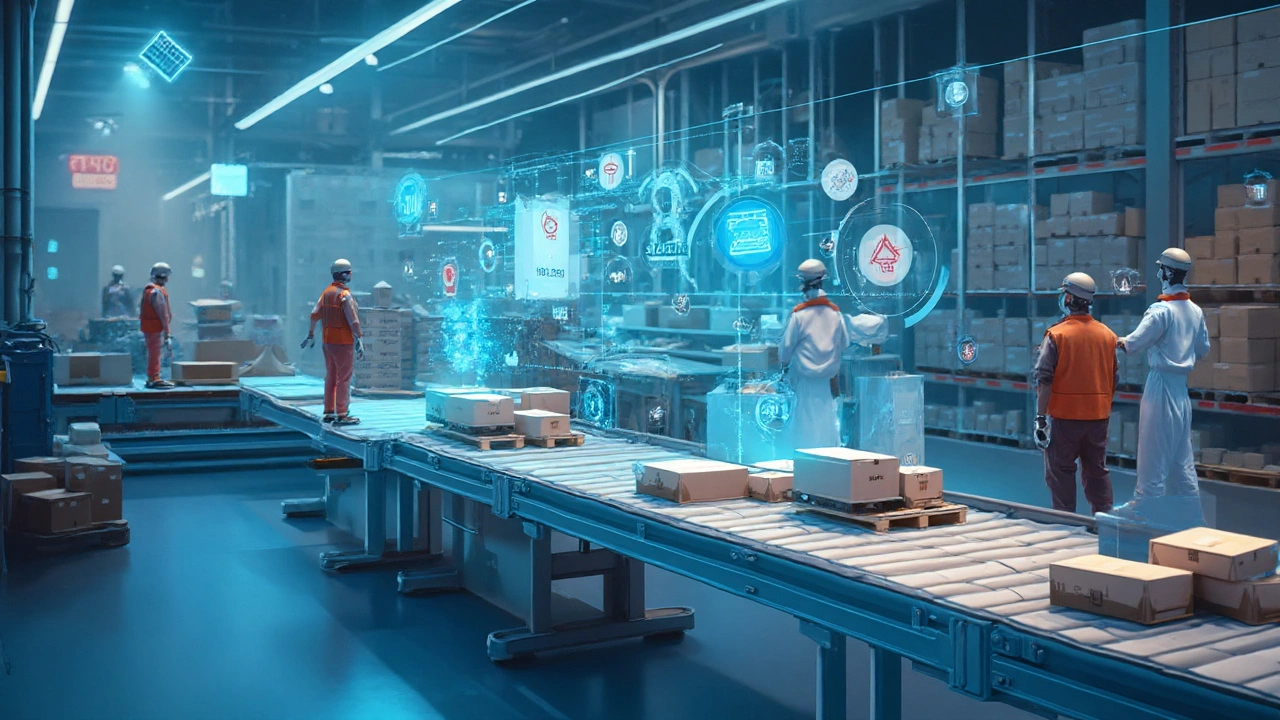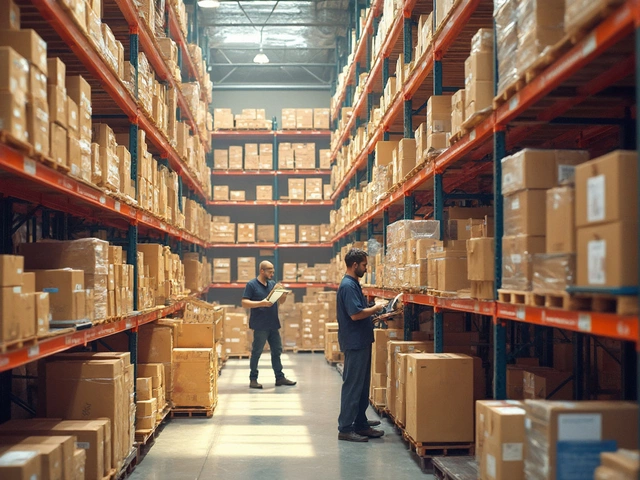If you’ve ever waited for a delivery that took ages or gotten a box looking like it moonlighted as a soccer ball, you know how much logistics matters. Businesses can live and die by their choice of logistics company. And it’s not just businesses—shoppers have become picky. Want to know which company sits on top in 2025? Spoiler: There’s no single winner, but there are clear ways to spot the best.
What Makes a Logistics Company Truly the Best?
There’s no magic company that rules every corner of the logistics world. Different leaders show up depending on your needs—massive international shipping or next-day city delivery, for instance. But there are unmistakable traits the best players share. Speed sounds obvious, but it’s not just about rushing—predictability and flexibility are gold. Nobody likes tracking an order that’s stuck in sorting limbo for days. Companies like DHL, FedEx, and UPS keep popping up in rankings for a reason: they invest heaps in tech, so customers always know where their stuff is.
Let’s get specific. According to logistics companies industry research by Armstrong & Associates, DHL handled 2.3 million tons of air freight and 3 million TEU (that’s Twenty-foot Equivalent Units) of ocean freight last year. Their secret? They’ve digitized almost everything, from customs paperwork to instant tracking. Instead of drowning in emails, you have a real-time dashboard that could make a pilot jealous. FedEx brings its legendary Express service with deliveries often arriving ahead of schedule and offers predictive analytics for bulk shippers. UPS impresses with its global network—delivering to over 220 countries, even to places where GPS coverage might as well be science fiction.
But here’s something less obvious: customer support can make or break everything. If you’ve ever tried calling a helpline and gotten stuck in eternal hold music, you already know. The best companies today offer chat, email, phone, even WhatsApp—often with actual humans on the other end. They also put a lot of muscle into reverse logistics, making returns painless. Why sweat over a return label when they’ll pick it up straight from your porch?
How green a company is also matters more. Amazon Logistics and Maersk are pouring billions into electric vehicles and smart route planning to chop emissions. In 2025, a company’s eco-cred is a serious tie-breaker, as many buyers demand more than fast shipping—they want responsible practices. The right partner should adapt quickly, too. Whether it’s pandemic-level chaos or peak holiday demand, leaders in this game have backup plans, tech solutions, and team agility. A McKinsey headliner last year drove this home:
"Resilience is the new efficiency: top logistics companies set themselves apart by bouncing back—fast—when disruption hits."
Unpacking the Industry Giants: DHL, FedEx, UPS, and the Game Changers
DHL may have the most recognizable fleet of yellow vehicles—and for good reason. Their 615,000+ employees span nearly every continent, allowing them to move goods almost anywhere within a day. They’re also first to pilot new delivery tech: in Germany, they deliver parcels by drone in remote mountain towns. Results are wild—runs that used to take hours by car now zip over treetops in minutes. DHL’s prowess really comes out with complicated international shipments like dangerous goods or medical equipment, where red tape can strangle less experienced shippers.
FedEx wins over businesses needing speed and scale. Their Express division is legendary—one of the only companies whose planes moved even during the earliest COVID lockdowns. FedEx invests heavily in AI for route planning, slicing delivery times during events like Black Friday by up to 25%. Their custom solutions for sectors like healthcare and electronics mean you don’t get a one-size-fits-all answer. This attention to industry-specific needs stamps FedEx as a favorite for retailers and manufacturers alike.
UPS is the old-guard behemoth with a twist. UPS has put down roots in sustainability, pioneering hybrid trucks and pushing paperless invoicing far earlier than rivals. Businesses love their Saturday delivery and Guaranteed Service Refund—if a shipment fails to hit a full promised schedule, you get cash back. UPS is also famous for its “no left turns” route planning, saving 10 million gallons of fuel each year just by rethinking how drivers loop through city streets.
Now, you’ll also hear about upstarts like XPO Logistics and Kuehne + Nagel. XPO doubled its presence through savvy tech investments—automated distribution centers, AI “co-pilot” routing, and real-time pallet tracking via app. They’re a hot pick for mid-sized businesses wanting transparency usually reserved for Fortune 500 giants. Kuehne + Nagel dominates cross-ocean shipping, managing 4.7 million TEU each year, and shines especially for fashion and electronics brands that need careful temperature or speed guarantees.
Here's some fresh data for comparison:
| Company | Employees | Countries Covered | Specialty | 2024 Revenue (USD Billion) |
|---|---|---|---|---|
| DHL | 615,000 | 220+ | International Express, Supply Chain | 88 |
| FedEx | 500,000 | 220 | Express, Reliable Tracking | 92 |
| UPS | 540,000 | 220+ | Sustainability, Small Packages | 100 |
| Kuehne + Nagel | 95,000 | 100+ | Freight Forwarding | 48 |
| XPO Logistics | 50,000 | 30+ | Tech-Driven Efficiency | 12 |
Curious about last-mile players? Amazon Logistics and DPD are making big moves there. Amazon’s “Key” service now covers more than 10 million US homes, letting delivery drivers safely drop off packages inside locked garages (with cam footage!). DPD, known in Europe, uses AI to predict 1-hour delivery windows, beating the "sometime between 8am and 8pm" routine, and boosting customer happiness to over 96% on recent surveys.

Choosing the Best Company for Your Logistics Needs
Here’s where a little self-reflection pays off. The best company for you depends on exactly what you’re shipping, how fast it needs to move, and where it’s headed. If you’re running a big e-commerce store, reliability and real-time tracking sit high on the wish list. FedEx and UPS both offer plug-and-play APIs for automating labels, tracking, and returns—integrations with Shopify, WooCommerce, or custom stores can save a mountain of headaches.
Moving fragile or valuable items? Watch for companies with good insurance and careful handling. DHL stands out for international goods and hazardous items. Their customs brokerage can skip those “package held at customs” nightmares. For high volume or heavy stuff, like pallets or machinery, Kuehne + Nagel or Maersk handle it daily—for these, look for container tracking, port-to-door solutions, and dedicated account reps who know your sector’s quirks.
For local last-mile services, Amazon and DPD are aces with flexibility—weekend, same-day, you name it. DPD’s smartphone app sends a selfie from the driver at delivery—a neat anti-fraud trick a lot of shoppers now expect. Recent stats show over 80% of B2C businesses in the UK now offer same-day delivery in partnership with logistics providers like these.
If you’re a small business on a budget, check companies that allow “pay-as-you-go” or let you aggregate shipments for lower pricing. XPO Logistics shines there, especially for businesses nervous about hidden fees. Many providers use sliding scales, so your per-package cost drops as you ship more. Don’t ignore warehouse partners, either—integrated warehousing and distribution cut out a lot of manual headaches.
To stack the odds in your favor, create a checklist. Here are some tips:
- Ask for real customer references—one bad experience can undo a hundred "on paper" positives.
- Test their support line before committing—see how they respond to curveballs.
- Review customer portals and mobile apps, since ease-of-use saves time daily.
- Check what happens if a shipment is delayed—honest, upfront companies stand out here.
- Ask about green initiatives if sustainability is core to your brand.
Sometimes, the best solution is to blend companies: use FedEx for international express, UPS for domestic, and a local firm for last-mile delivery. That way, you always have a fallback if a single provider runs into issues (strikes, weather delays—life happens!).
Trends and Tech: Where the Best Are Heading in 2025
The logistics world isn’t just about big trucks and warehouses anymore—it’s getting smarter by the day. Picture drones handling urgent deliveries at midnight, robot arms picking products in giant warehouses, and AI that reroutes your order before bad weather hits. Companies obsessed with tech upgrades are racing ahead.
According to a 2024 Statista report, “over 56% of logistics decision-makers plan to invest more in AI and automation compared to last year.” Think automated customs clearance, smart temperature sensors, or blockchain records for tracking authenticity. DHL is testing exoskeletons in packing centers—imagine workers lifting heavier loads with way less strain. FedEx has rolled out bots delivering prescriptions door-to-door in select US cities—a big win for patients who struggle with mobility.
Eco-friendly shipping is having a big moment, too. Europe’s biggest logistic zones are now banning diesel deliveries during peak hours, so companies have to swap in electric vans or even cargo e-bikes. Amazon and UPS are locked in a bit of an electric van arms race. Maersk isn’t just making ships more efficient—they’re using biofuel blends, cutting emissions on massive Asia-Europe routes.
Let’s talk data. Companies that treat tracking data like gold—using it to predict hiccups, plan inventory, and update customers constantly—are trusted more by both shippers and end buyers. Having a live map or hourly updates wins loyalty (who checks tracking only once, right?). According to survey data, 70%+ of shoppers in the EU and US said “fast, accurate tracking” was their top reason for picking one retailer over another.
If you’re planning for the future, watch for companies with an eye on drones, blockchain, and serious security. The best logistics partners don’t just keep up—they set new standards and help their clients grow. Think of them less as delivery drivers and more as behind-the-scenes business boosters.
Want the inside track? The next “big” logistics company might be a surprise. With startups blending robotics, big data, and crazy-fresh business models, there’s room for a shake-up. Keep your eyes peeled for new names, but for now, you can’t go wrong sticking with proven leaders—just be sure to check how well they match your own tech and business needs first.





